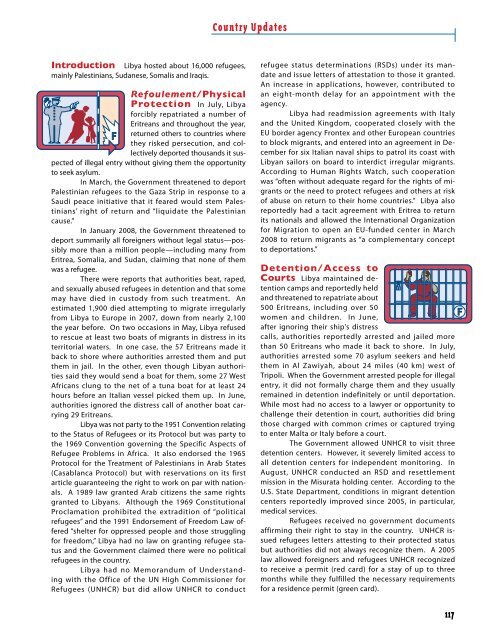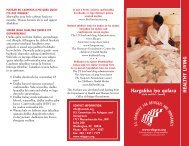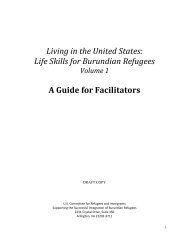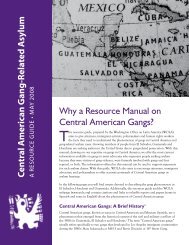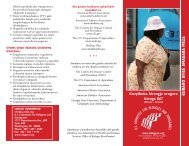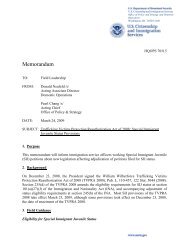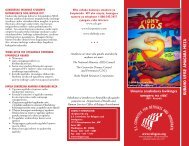Refugees and Asylum Seekers
Refugees and Asylum Seekers
Refugees and Asylum Seekers
Create successful ePaper yourself
Turn your PDF publications into a flip-book with our unique Google optimized e-Paper software.
Introduction Libya hosted about 16,000 refugees,<br />
mainly Palestinians, Sudanese, Somalis <strong>and</strong> Iraqis.<br />
F<br />
Refoulement/Physical<br />
Protection In July, Libya<br />
forcibly repatriated a number of<br />
Eritreans <strong>and</strong> throughout the year,<br />
returned others to countries where<br />
they risked persecution, <strong>and</strong> collectively<br />
deported thous<strong>and</strong>s it suspected<br />
of illegal entry without giving them the opportunity<br />
to seek asylum.<br />
In March, the Government threatened to deport<br />
Palestinian refugees to the Gaza Strip in response to a<br />
Saudi peace initiative that it feared would stem Palestinians’<br />
right of return <strong>and</strong> “liquidate the Palestinian<br />
cause.”<br />
In January 2008, the Government threatened to<br />
deport summarily all foreigners without legal status—possibly<br />
more than a million people—including many from<br />
Eritrea, Somalia, <strong>and</strong> Sudan, claiming that none of them<br />
was a refugee.<br />
There were reports that authorities beat, raped,<br />
<strong>and</strong> sexually abused refugees in detention <strong>and</strong> that some<br />
may have died in custody from such treatment. An<br />
estimated 1,900 died attempting to migrate irregularly<br />
from Libya to Europe in 2007, down from nearly 2,100<br />
the year before. On two occasions in May, Libya refused<br />
to rescue at least two boats of migrants in distress in its<br />
territorial waters. In one case, the 57 Eritreans made it<br />
back to shore where authorities arrested them <strong>and</strong> put<br />
them in jail. In the other, even though Libyan authorities<br />
said they would send a boat for them, some 27 West<br />
Africans clung to the net of a tuna boat for at least 24<br />
hours before an Italian vessel picked them up. In June,<br />
authorities ignored the distress call of another boat carrying<br />
29 Eritreans.<br />
Libya was not party to the 1951 Convention relating<br />
to the Status of <strong>Refugees</strong> or its Protocol but was party to<br />
the 1969 Convention governing the Specific Aspects of<br />
Refugee Problems in Africa. It also endorsed the 1965<br />
Protocol for the Treatment of Palestinians in Arab States<br />
(Casablanca Protocol) but with reservations on its first<br />
article guaranteeing the right to work on par with nationals.<br />
A 1989 law granted Arab citizens the same rights<br />
granted to Libyans. Although the 1969 Constitutional<br />
Proclamation prohibited the extradition of “political<br />
refugees” <strong>and</strong> the 1991 Endorsement of Freedom Law offered<br />
“shelter for oppressed people <strong>and</strong> those struggling<br />
for freedom,” Libya had no law on granting refugee status<br />
<strong>and</strong> the Government claimed there were no political<br />
refugees in the country.<br />
Libya had no Memor<strong>and</strong>um of Underst<strong>and</strong>ing<br />
with the Office of the UN High Commissioner for<br />
<strong>Refugees</strong> (UNHCR) but did allow UNHCR to conduct<br />
refugee status determinations (RSDs) under its m<strong>and</strong>ate<br />
<strong>and</strong> issue letters of attestation to those it granted.<br />
An increase in applications, however, contributed to<br />
an eight-month delay for an appointment with the<br />
agency.<br />
Libya had readmission agreements with Italy<br />
<strong>and</strong> the United Kingdom, cooperated closely with the<br />
EU border agency Frontex <strong>and</strong> other European countries<br />
to block migrants, <strong>and</strong> entered into an agreement in December<br />
for six Italian naval ships to patrol its coast with<br />
Libyan sailors on board to interdict irregular migrants.<br />
According to Human Rights Watch, such cooperation<br />
was “often without adequate regard for the rights of migrants<br />
or the need to protect refugees <strong>and</strong> others at risk<br />
of abuse on return to their home countries.” Libya also<br />
reportedly had a tacit agreement with Eritrea to return<br />
its nationals <strong>and</strong> allowed the International Organization<br />
for Migration to open an EU-funded center in March<br />
2008 to return migrants as “a complementary concept<br />
to deportations.”<br />
Detention/Access to<br />
Courts Libya maintained detention<br />
camps <strong>and</strong> reportedly held<br />
<strong>and</strong> threatened to repatriate about<br />
500 Eritreans, including over 50<br />
F<br />
women <strong>and</strong> children. In June,<br />
after ignoring their ship's distress<br />
calls, authorities reportedly arrested <strong>and</strong> jailed more<br />
than 50 Eritreans who made it back to shore. In July,<br />
authorities arrested some 70 asylum seekers <strong>and</strong> held<br />
them in Al Zawiyah, about 24 miles (40 km) west of<br />
Tripoli. When the Government arrested people for illegal<br />
entry, it did not formally charge them <strong>and</strong> they usually<br />
remained in detention indefinitely or until deportation.<br />
While most had no access to a lawyer or opportunity to<br />
challenge their detention in court, authorities did bring<br />
those charged with common crimes or captured trying<br />
to enter Malta or Italy before a court.<br />
The Government allowed UNHCR to visit three<br />
detention centers. However, it severely limited access to<br />
all detention centers for independent monitoring. In<br />
August, UNHCR conducted an RSD <strong>and</strong> resettlement<br />
mission in the Misurata holding center. According to the<br />
U.S. State Department, conditions in migrant detention<br />
centers reportedly improved since 2005, in particular,<br />
medical services.<br />
<strong>Refugees</strong> received no government documents<br />
affirming their right to stay in the country. UNHCR issued<br />
refugees letters attesting to their protected status<br />
but authorities did not always recognize them. A 2005<br />
law allowed foreigners <strong>and</strong> refugees UNHCR recognized<br />
to receive a permit (red card) for a stay of up to three<br />
months while they fulfilled the necessary requirements<br />
for a residence permit (green card).<br />
117


